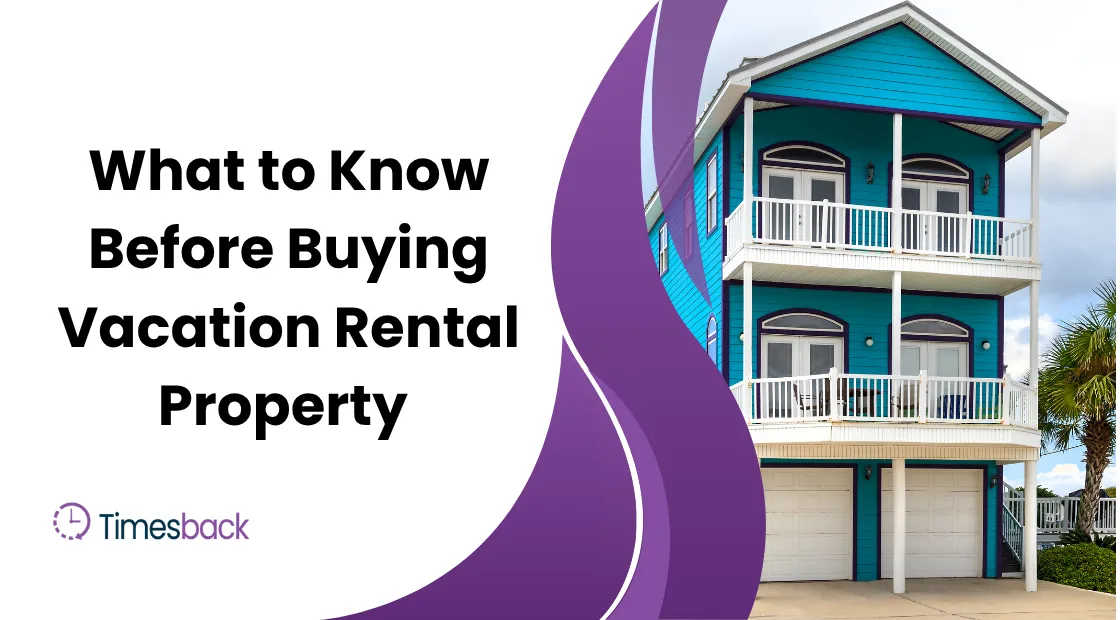购买度假租赁房产前需要了解哪些内容

购买度假租赁房产可以开启一个充满财务机遇的世界,将房地产投资的吸引力与酒店业的魅力完美结合。
广告
然而,投身这项事业需要的不仅仅是拥有海滨别墅或山间小屋的梦想。
这需要敏锐的远见、周密的计划以及对风险和回报的清醒评估。
本指南详细阐述了您需要考虑的关键因素,提供新的见解、实用的策略和可操作的步骤,以确保您的投资在当今瞬息万变的市场中蓬勃发展。
广告
从市场分析到法律细则,让我们一起探讨如何做出符合您财务目标的明智决策。
了解度假租赁市场的现状也能带来竞争优势。
随着市场的发展,及时了解趋势和消费者偏好对于最大限度地发挥投资潜力至关重要。
为什么度假租赁不仅仅是一种潮流
度假租赁的吸引力在于其双重优势:既能带来收入,又能带来个人享受。
与传统租赁不同,度假房产迎合短期客人的需求,通常每晚价格更高。
AirDNA 发布的 2024 年报告显示,全球度假租赁市场创造了 $670 亿美元的收入,其中美国占了近 40% 的份额。
这一统计数据凸显了该行业的韧性,即使在经济波动的情况下也是如此。
但为什么这个市场如此强劲?
旅行者越来越渴望独特、如家般的体验,而不是千篇一律的酒店,这推动了对风景优美或文化底蕴深厚地区的酒店的需求。
投资度假屋不仅仅是追逐潮流,更是为了顺应文化变革。
Airbnb 和 Vrbo 等平台使市场民主化,让房东能够接触到全球受众。
然而,成功与否取决于了解哪些因素能让出租房产盈利。
仅仅购买一栋迷人的小屋是不够的;你必须预判客人的期望、当地的法规和运营需求。
把它想象成种植葡萄园:合适的土壤、气候和精心照料会带来丰收,但如果任何一个环节判断失误,葡萄藤就会枯萎。
此外,随着消费者偏好转向可持续发展,采用环保措施的酒店可能会吸引更多客人。
投资绿色设施可以提升房产的吸引力,同时也能对环境产生积极影响。
地点:您投资的核心所在
在哪里购买和购买什么一样重要。
位置平庸却拥有一处绝美房产,就像一辆没有燃料的跑车——漂亮却无法行驶。
重点关注旅游业发展强劲的地区:靠近海滩、滑雪胜地、国家公园或繁华的都市中心。
研究季节性需求模式,以确保全年都有预订。
例如,科罗拉多州阿斯彭的一间小木屋在冬季可能生意兴隆,但在夏季却生意惨淡,而迈阿密的一套公寓则可能因为其常年吸引人而一直保持着稳定的需求。
考虑无障碍设施和便利设施。
该房产靠近机场或主要高速公路吗?
附近有餐厅、远足步道或文化景点吗?
Booking.com 的数据显示,62% 的旅行者优先考虑活动多样化的目的地,因此请根据您的喜好选择合适的目的地。
新兴市场,例如国家公园附近的小城镇,可以提供较低的准入门槛和较少的竞争。
例如,大烟山国家公园附近的湖畔小屋可以吸引徒步旅行者和家庭,兼具价格实惠和入住率高的优点。
表1:美国主要度假租赁市场(2025年展望)
| 城市 | 平均每晚房价 | 年度入住率 | 主要景点 |
|---|---|---|---|
| 佛罗里达州迈阿密 | $220 | 78% | 海滩、夜生活 |
| 北卡罗来纳州阿什维尔 | $180 | 72% | 蓝岭山脉 |
| 犹他州帕克城 | $300 | 65% | 滑雪胜地 |
| 佐治亚州萨凡纳 | $195 | 70% | 历史魅力,节日庆典 |
资料来源:AirDNA市场洞察,2024年
此外,投资位于新兴社区的房产,随着这些地区的发展,可以带来可观的回报。
及早发现趋势可以帮助您从不断上涨的房价中获利。
财务现实:数字分析
购买度假租赁房产之前,务必仔细分析财务状况。
首先计算购置成本——购买价格、过户费和装修费用。
然后,还要考虑持续性支出:房产税、保险、维护和平台费(Airbnb 向房东收取每次预订 3-5% 的费用)。
不要忽视营销成本或专业管理费用,如果您聘请物业经理,这些费用可能高达 10-25% 的收入。
收入潜力取决于入住率和每晚价格。
一处房产每晚租金为 $200,入住率为 70%,每年可产生约 $51,100 的收入(假设每年 365 天)。
扣除支出后,您的净收入可能在 $20,000 到 $35,000 之间,具体取决于成本。
将此与当地长期租赁收益率进行比较,以评估度假模式是否表现更佳。
使用 AirDNA 或 Mashvisor 等工具,根据本地数据估算收益。
示例 1:海滨公寓案例
简是一位科技企业家,她在南卡罗来纳州默特尔比奇购买了一套价值 $400,000 美元的公寓。
她花费了 140000 万美元进行装修,打造了一个可以欣赏海景、适合在 Instagram 上分享的住所。
她的每晚平均房价为 $250,入住率为 80%,每年可获得 $73,000 美元的收入。
扣除税款、保险费和 15% 管理费后,她的净利润为 $45,000,投资回报率为 10%。
Jane 的成功源于瞄准家庭市场,提供适合儿童的设施,并通过社交媒体影响者进行营销。
此外,详细记录所有支出和收入可以为未来的投资提供宝贵的参考信息。
跟踪财务业绩有助于发现需要改进和发展的领域。

法律和监管障碍
地方法规可能会决定你的投资成败。
一些城市,如旧金山或纽约,制定了严格的短期租赁法律,要求获得许可或限制租赁天数。
而像奥兰多这样的城市则较为宽松,从而培育出了蓬勃发展的度假租赁生态系统。
研究分区法、业主协会(HOA)规则和纳税义务。
例如,佛罗里达州要求房东收取 6% 州销售税以及地方旅游税,各县的税率有所不同。
聘请当地律师来应对这些复杂情况。
不遵守规定可能会导致罚款或禁令,从而使您的投资蒙受损失。
问问自己: 如果监管收紧,你准备好调整策略了吗?
保持积极主动——关注市议会的最新动态或加入当地的活动组织者网络——可以让你始终走在变化的前沿。
此外,利用科技手段了解监管变化可以加强您的合规工作。
订阅本地房地产新闻简报或加入在线论坛可以提供及时的最新信息。
++ 房地产投资中的杠杆作用
设计以客人为中心的酒店
度假租赁的成功与否取决于客人的体验。
与长期租赁不同,短期租客希望享受到酒店般的便利设施,同时又不失住宅的温馨舒适。
投资购置高品质家具、可靠的无线网络,以及贴心的小细节,例如迎宾礼篮或当地旅游指南。
拥有独特设施的房产——例如热水浴缸、篝火坑或主题装饰——会脱颖而出。
根据 Vrbo 的数据,带有热水浴缸的房源预订率高出 15%。
例2:都市阁楼的成功
退休教师马克在纳什维尔艺术区买了一套价值 $300,000 美元的阁楼公寓。
他将其改造成了一个以音乐为主题的度假胜地,里面摆放着黑胶唱片和吉他,供客人演奏。
他通过向入住一周的客人提供免费音乐会门票,将入住率提高到 85%,每年产生 $60,000 的收入。
他专注于体验式设计——迎合纳什维尔的音乐文化——使他的房产在竞争激烈的市场中脱颖而出。
此外,根据客人的反馈定期更新您的房源可以提高客人的满意度并鼓励再次预订。
营造热情友好的氛围有助于获得好评和口碑推荐。
市场营销和客户获取
购买度假租赁房产只是成功的一半;吸引客人才是另一半。
使用专业的照片、引人入胜的描述和有竞争力的价格来优化您的房源信息。
突出独特的卖点,例如靠近景点或允许携带宠物等政策。
利用 Airbnb、Vrbo、Booking.com 等多个平台最大限度地提高曝光率,但要同步日历以避免重复预订。
社交媒体可以扩大你的影响力。
创建一个 Instagram 页面,展示您房产的魅力、当地活动或宾客评价。
与旅游博主或网红合作,进行真实有效的推广。
动态定价工具(例如 Beyond Pricing)会根据需求调整价格,确保您在旺季获得利润,同时又不会吓跑淡季客人。
表2:度假租赁的营销策略
| 战略 | 成本 | 影响 | 最适合 |
|---|---|---|---|
| 专业摄影 | $500-$1,000 | 20% 更高的预订率 | 所有属性 |
| 社交媒体宣传活动 | $100-$500/月 | 建立品牌忠诚度 | 都市时尚目的地 |
| 动态定价工具 | $10-$50/月 | 10-15% 收入增长 | 高需求市场 |
| 本地合作伙伴关系 | 多变的 | 吸引小众旅行者 | 景点附近的房产 |
资料来源:作者基于行业趋势的分析
此外,利用电子邮件营销让老顾客了解促销活动或当地活动,可以培养顾客忠诚度并促进重复预订。
定期沟通有助于与客人保持良好关系,鼓励他们再次光临。

风险管理与长期规划
任何投资都有风险,度假租赁也不例外。
经济衰退、自然灾害或旅游趋势的变化都可能影响预订量。
通过全面的保险来降低风险,包括责任险和财产损失险。
通过向数字游民或旅行专业人士提供中期租赁(30 天以上)服务来实现收入多元化,减少对短期房客的依赖。
制定可扩展性计划。
如果你的第一处房产表现良好,可以考虑采用投资组合策略,在不同的市场收购互补型房产,以对冲季节性风险。
利润再投资于资产升级或债务偿还,以提升股权。
将出租房产视为一项事业,而不是爱好,制定明确的财务目标和退出策略。
此外,定期进行市场调研可以帮助您发现新兴趋势并相应地调整您的策略。
掌握市场变化趋势可以增强你的竞争优势。
想了解更多关于度假租赁投资的信息,请查看 BiggerPockets.
人的因素:平衡激情与利润
拥有度假租赁房产不仅仅是数字的问题,更重要的是创造难忘的体验。
客人回到住处时,会感到温馨舒适,而不是冷冰冰的。
在您的房源信息中分享您的故事:您为什么选择这个地点?它有什么特别之处?
真实性能够引起共鸣。
然而,要兼顾热情与务实。
过度投资于装修或低估维护成本都会侵蚀利润。
定期查看顾客反馈,改进您的服务,确保其与市场需求同步发展。
此外,与客人建立个人联系可以提升他们的体验,并带来好评。
在客人入住期间与他们互动,可以创造持久的回忆,并鼓励他们向他人推荐您的房源。
最终思考:值得吗?
购买度假租赁房产可以带来独特的经济收益和生活方式上的好处,但这并不是一项被动的活动。
成功需要研究、战略规划和适应能力。
通过选择合适的地点、掌握财务、遵守法规以及优先考虑宾客体验,您可以打造一项蓬勃发展的投资。
市场规模($670亿美元,而且还在不断增长)预示着机遇,但这只对那些勤奋创新的人而言才是机遇。
那么,你准备好将梦想中的房产变成现实了吗?还是会让各种复杂情况阻碍你前进?
选择权在你手中,但只有敢于明智规划的人才能获得回报。
